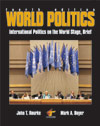Is power a particularly male sexual impulse? What explanation do we have for the fact that most heads of state around the world are men? What impact on social, economic, and foreign policy does that have? Can you envision a world where the majority of heads of state are women? How do you envision that state? Would it be substantially different than a world run by men? Or do you think it would be essentially the same as it is now? Some analysts argue that if women were involved on an equal basis with men in political life, including decision-making, at the national and international levels, they would make a qualitative difference, in terms of content and style, to the benefit of society and the achievement of the goal of peace. At the present time, (2001), there are nine countries with a woman as its head of state or government: Bangladesh, Finland, Ireland, Latvia, New Zealand, Panama, Saint Lucia, San Marino and Sri Lanka. Assume you are the head of a committee organizing a conference on the role of individual governments in international realms of social and economic policy. For this conference, you want only the opinions of women active in government. You will set up a panel of three heads of state and have them answer some specific questions that will give an audience insight into how policy would be formulated and implemented from a female perspective. Before you select the panel participants, read the reports and biographies of female heads of state at the Web sites listed on the Resources page. Then begin the exercise. |



 2002 McGraw-Hill Higher Education
2002 McGraw-Hill Higher Education